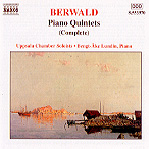Swedish Romantic composer Franz Berwald was largely neglected during his lifetime, being forced to make a living as a skilled orthopedic surgeon while writing music on the side. His symphonies have been rediscovered over the years and have proven to be highly original, tuneful, well-orchestrated, and thoroughly worthwhile. They have delighted listeners who have discovered them through a meager handful of recordings. Those expecting the same rewards from these quintets are going to be sadly disappointed. These are, in a word, mediocre compositions, well written for the five instruments, yet totally lacking in inspiration. Usually starting with a melody that is far from memorable, Berwald subjects his tune to busy, workmanlike development, with boring results. The quintets are well performed here, by a soloist and ensemble that has good intonation, solid tone, and good rhythmic and lyrical sense–but to no avail. The sound also is quite good, with the four string instruments spread left to right behind the centered piano. Perhaps in the near future we will hear this talented ensemble in music more worthy of its involvement.
































